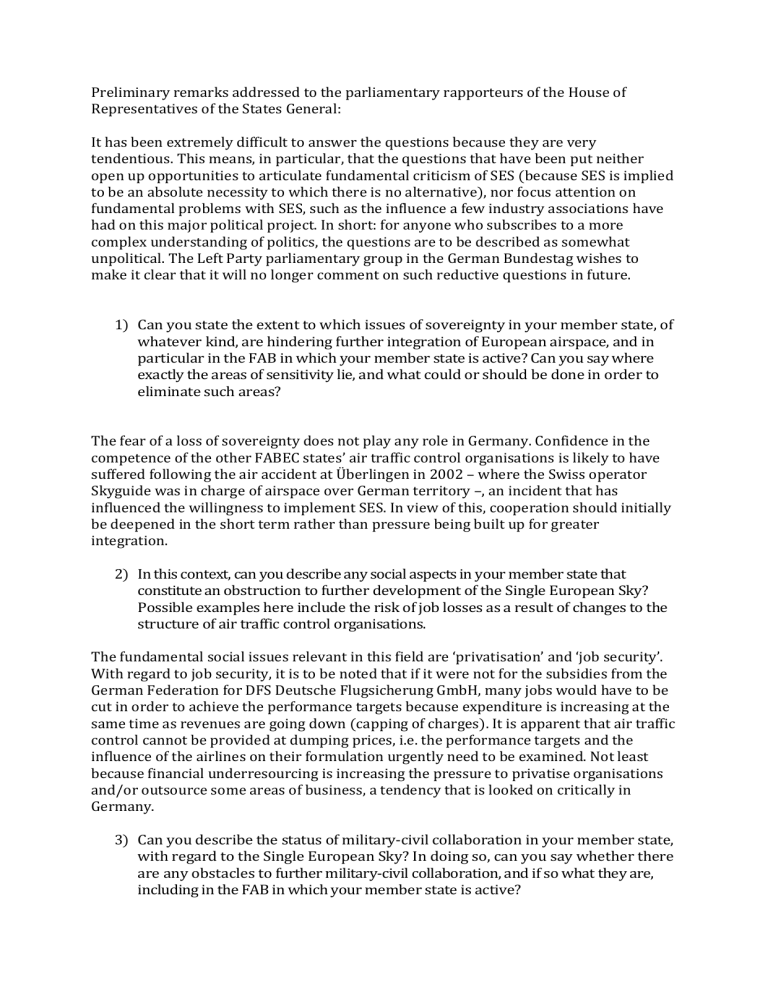
Preliminary remarks addressed to the parliamentary rapporteurs of the House of
Representatives of the States General:
It has been extremely difficult to answer the questions because they are very
tendentious. This means, in particular, that the questions that have been put neither
open up opportunities to articulate fundamental criticism of SES (because SES is implied
to be an absolute necessity to which there is no alternative), nor focus attention on
fundamental problems with SES, such as the influence a few industry associations have
had on this major political project. In short: for anyone who subscribes to a more
complex understanding of politics, the questions are to be described as somewhat
unpolitical. The Left Party parliamentary group in the German Bundestag wishes to
make it clear that it will no longer comment on such reductive questions in future.
1) Can you state the extent to which issues of sovereignty in your member state, of
whatever kind, are hindering further integration of European airspace, and in
particular in the FAB in which your member state is active? Can you say where
exactly the areas of sensitivity lie, and what could or should be done in order to
eliminate such areas?
The fear of a loss of sovereignty does not play any role in Germany. Confidence in the
competence of the other FABEC states’ air traffic control organisations is likely to have
suffered following the air accident at Überlingen in 2002 – where the Swiss operator
Skyguide was in charge of airspace over German territory –, an incident that has
influenced the willingness to implement SES. In view of this, cooperation should initially
be deepened in the short term rather than pressure being built up for greater
integration.
2) In this context, can you describe any social aspects in your member state that
constitute an obstruction to further development of the Single European Sky?
Possible examples here include the risk of job losses as a result of changes to the
structure of air traffic control organisations.
The fundamental social issues relevant in this field are ‘privatisation’ and ‘job security’.
With regard to job security, it is to be noted that if it were not for the subsidies from the
German Federation for DFS Deutsche Flugsicherung GmbH, many jobs would have to be
cut in order to achieve the performance targets because expenditure is increasing at the
same time as revenues are going down (capping of charges). It is apparent that air traffic
control cannot be provided at dumping prices, i.e. the performance targets and the
influence of the airlines on their formulation urgently need to be examined. Not least
because financial underresourcing is increasing the pressure to privatise organisations
and/or outsource some areas of business, a tendency that is looked on critically in
Germany.
3) Can you describe the status of military-civil collaboration in your member state,
with regard to the Single European Sky? In doing so, can you say whether there
are any obstacles to further military-civil collaboration, and if so what they are,
including in the FAB in which your member state is active?
As in all the EU states, the use of what has hitherto been military airspace for civil
aviation and/or moves towards this pose problems, above all around bases that belong
to the US Armed Forces. They cannot be resolved as part of the SES negotiations because
it is necessary to reach agreement with the US Administration.
4) Can you give your views on the current lack of progress with regard to the SESII+
package? In doing so, can you state whether you also believe it important that
progress should be made with regard to the package?
SES II+ not only contains measures to speed up the implementation of the existing SES
agreements, but also shifts powers to the EU level, a move that is opposed by all the
parliamentary groups in the German Bundestag and has not increased their motivation
to implement SES – rather the contrary. It makes no sense to impose controversial, new
requirements on an implementation process that is not functioning. SES II+ should be
withdrawn.
5) Can you state whether there are any other obstacles to the creation of a Single
European Sky? If so, can you say where exactly these obstacles are located, and
what the reason is for their being apparently insurmountable or, as the case
may be, why they cannot be eliminated in the very short term?
The fundamental problems have already been touched on. SES itself will be problematic
unless it is complemented with other measures, above all when it comes to
environmental protection. Even if air routes were to be shortened by 10%, SES would
serve to increase airspace capacity, as a result of which the CO2 savings on each air
route would probably be outweighed by an increase in the number of flights. On its own,
SES is therefore not an instrument of environmental policy, but very clearly pursues
economic and industrial goals – not for nothing has it been a favourite project of the air
transport lobby for some decades. It would therefore be important to restrict this
lobby’s influence on the SES process, or otherwise social and ecological aspects will
continue to be ignored.

